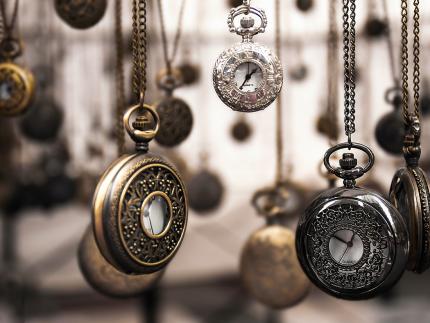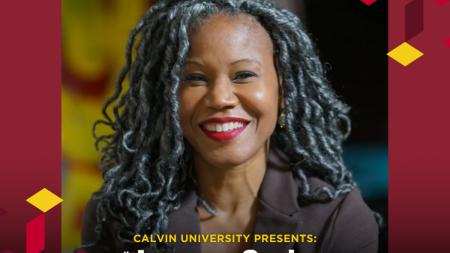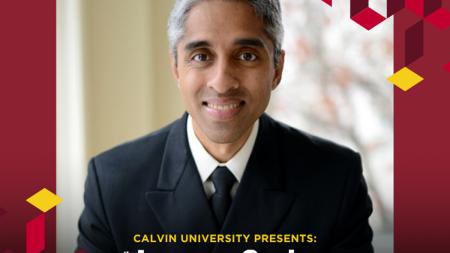Retreating for a Few Moments

Coordinated by Worship Ministries, a new self-guided retreat launched in December offers reflections, Scripture readings, prayers, music to listen to, and artwork geared to help participants put their feelings — in this era of COVID-19 — into words.
I was intrigued by the retreat, named simply Moments, and I decided, instead of plunging in to write a story as I normally do, to pause the hectic pace that I usually follow and to set aside a few hours to go through the event myself.
Katie Roelofs, a catalyzer for Worship Ministries, had drawn my attention to the retreat, created by Chicago-area artist Regina Jupp. Roelofs said it was initially to be available only during Advent for worship leaders in the CRC.
“We began to offer this retreat for church leadership to pause, step out of their ministry context, and do some spiritual and emotional catching up,” said Roelofs.
But because it’s been quite popular, with more than 70 attendees to date, the retreat is now open to anyone who wants to go through it by signing up here.
“The retreat is a gift from Regina to the church,” said Roelofs. “The response to this event exceeded our expectations. She put a lot of thought and prayer into it.”
Moment: In the Midst of Struggle
The retreat opens by asking if we are exhausted, if the pandemic has drained our energy.
Accompanying this first “moment” in the retreat is a photograph of a man sitting on a couch with his head in his hands, and another photo of a young woman standing outdoors with her hands cupping her neck. Both are a study in having a hard time; both of these persons look exhausted.
“You might feel numb or ragged right now,” wrote Jupp. “Maybe some of you are ignoring your feelings just to get through the day.”
I’m not sure if I was ignoring my feelings. But, before long, I settled into the retreat, and a sense of calm seeped into me. Setting deadlines aside, I was able, as Jupp writes, to “lean into the promise that God hears us and sees us—even in the struggle, even between our words.”
Helping to underscore the focus of this retreat was a Scripture verse from Romans 8:26 (ESV): “The Spirit helps us in our weakness. For we do not know what to pray for as we ought, but the Spirit himself intercedes for us with groanings too deep for words.”
This retreat can help us uncover “groans” within us that have been buried beneath the surface.
“I want to help people who are struggling in any way,” said Jupp in an interview. “I know that many people have experienced extended strain and are in crisis.”
Before the COVID-19 pandemic began, Jupp had been busy helping churches to reimagine themselves through art created by their congregation members.
But the pandemic shut that down. “I wondered what the next step for me should be, since I couldn’t leave my home,” she said.
Then, when Joyce Borger, director of Worship Ministries, asked Jupp if she would be interested in creating an online retreat for pastors and church leaders, she didn’t hesitate. “I saw that God was expanding how I can be useful,” said Jupp, a member of Lombard CRC in Lombard, Ill.
As she developed the retreat, Jupp said, she decided to create different “moments” as a way to draw more people into it — essentially giving options.
“Not everyone is going to be interested in the art, or the playlist of songs, or journaling —” she said, so she expanded the retreat’s moments to make them more inclusive.
Moment: Worship
The second moment of the retreat is about worshiping through music, and Jupp offers a link to a History of Music Therapy.
In this section, Jupp provides a range of songs that you can download on an app and listen to “as you walk, work, or . . . drive” — as you are busy with your life and yet feel led to “saturate your week with music that reminds you that God is with us in our vulnerability.”
I listened to a half-dozen of the songs, which did help as I settled deeper into the retreat. Then I tuned in to one of my own favorites, Dignus Est Deus (“God Is Worthy”), a Gregorian chant performed by the monks of the Abbey of Notre Dame. As they chanted, I pictured a dimly lit sanctuary, the smell of incense, and the voices of the monks rising to the rafters.
Moment: God’s Word
Introducing this next section, Jupp writes: “We have selected Scripture to bless you as you move throughout this week. You can use this exercise every day or just a few times this week.”
Accompanying this moment is a photograph of someone — possibly a monk — copying words from the Bible onto a blank sheet of paper.
Sitting at my desk in my basement, I looked through the Scriptures Jupp suggested and decided to go through a basic Lectio Divina, a practice of reading, dwelling in the Word, and prayer linked to a particular Scripture. I chose Isaiah 40:21-31.
Verse 26 of Isaiah 40 struck me: “Lift up your eyes and look to the heavens: Who created all these? He who brings out the starry host one by one and calls forth each of them by name.”
As the monks from the Abbey of Notre Dame chanted, I pondered this verse, and that led to me thinking about the Hubble Space Telescope and images I’ve seen from it.
So I went online and scrolled through some photos showing swirling, multicolored galaxies, dying stars blinking out in the vastness of the universe, and oceanic clouds of mist or hydrogen gas possibly creating a new galaxy.
Looking at these images made me think of God, creator of the universe. The space telescope peers into outer space; we see much darkness sprinkled by stars. Is there life out there? We wonder.
But we are also stupefied by all that God has created — and the fact that, even though we are like a speck of dust in a huge, incomprehensible universe, God sent his only Son to come to us in human flesh in the person of Jesus to redeem us.
Moment: Between the Words
In the next moment, Jupp talks about the simple but not simplistic art of Mark Rothko, an abstract painter whose storied career spanned five decades. Jupp then leads us through a time of painting — in whatever ways we see fit — on a large sheet of paper. Along with her instructions is a list of words that can help to identify our emotions.
Rothko’s paintings are deceptively beautiful — several feature rectangles with bold lines of color running through them. The colors have various tones, reflecting different emotions. I liked the art and, with him in mind, sketched a drawing or two in my notepad — nothing great, but it was enjoyable to do.
When I had the chance to see the art others had made, I was blown away by the beauty and creativity: strong lines; wonderful, colorful swirls; images of flowers; words etched into a sun-colored background. Those images reminded me of the universe’s heavenly stars and rolling clouds of gases.
Moment: Words We Think
In the last moment, Jupp suggests that we develop an attitude of gratitude, finding small ways to remember and acknowledge the gifts we have received from God. She lists many words for us to consider, suggesting that we seek to find inspiration by thinking about, for example, our family and friends, the funny things children do, neighbors, mentors, and teachers.
I thought through the list and began to, in gratitude, pray for all those who are close to me.
After about four hours, I finished the retreat. I found myself reoriented toward God, and I remembered, especially in this time of pandemic, that there are many people for whom I am grateful.
I could say more in wrapping up, such as how this retreat really is a well-conceived way to help us shed the clutter and look more deeply for God right now.
But let’s have Regina Jupp offer a closing word:
“What resonates with one person doesn’t necessarily resonate with another. That’s why, after creating the art moment, I felt I needed to expand the retreat and create other moments. . . . I wanted to offer something for everyone — and the reminder that not only is God with you, but it’s also time to resume some life-giving practices.”
The retreat will continue to be available to anyone for free at reginajupp.com/retreat.


